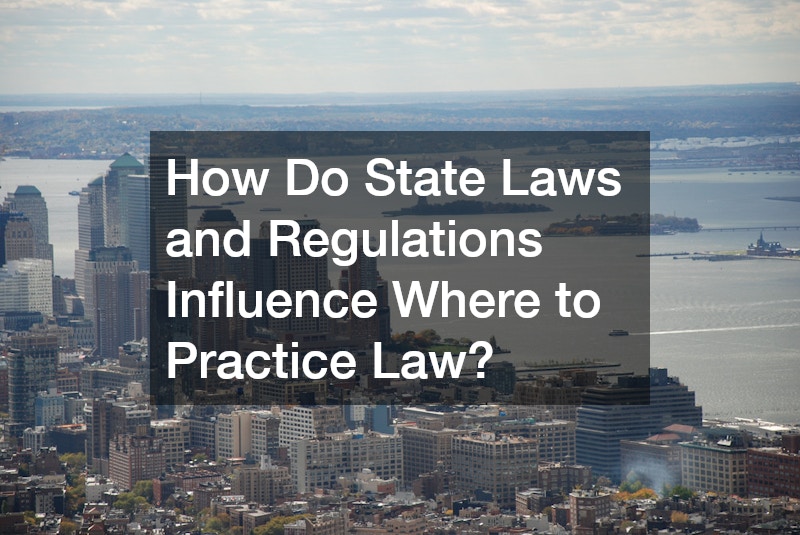1. What are the Best States for Legal Job Opportunities?

1.1 High-Demand Areas for Lawyers
Legal job opportunities can vary significantly across states, often influenced by the local economy, population density, and the prevalence of specific industries. High-demand areas for lawyers often include major metropolitan regions where businesses thrive, leading to a greater need for legal services. For example, states like California and New York frequently rank high in demand for various legal specialties, including corporate law, and intellectual property, making them prime locations for those entering the legal profession.
1.2 States with Large Legal Markets
States with large legal markets tend to provide abundant opportunities for lawyers. According to data, California, New York, Texas, and Florida consistently showcase expansive legal markets driven by their substantial populations and vibrant economies. In these states, lawyers may find job openings across diverse sectors, such as personal injury lawyers focusing on litigation, or professionals specializing in wills and trusts for estate planning.
1.3 Impact of Industry Growth on Job Opportunities
The growth of specific industries can dramatically impact legal job opportunities. States that are home to booming industries—such as technology in California or finance in New York—often require an array of legal services, thereby increasing the demand for lawyers. For instance, the rise of tech companies in Silicon Valley has led to a greater need for lawyers versed in intellectual property and contract law.
1.4 Rural vs Urban Job Prospects
The job prospects for lawyers can vary between urban and rural areas. Urban environments typically offer more opportunities due to the concentration of businesses and clients needing legal services. For example, cities with high crime rates often provide a large demand for those specializing in criminal law.
Conversely, rural areas may present limited job openings but can offer unique opportunities for lawyers willing to serve smaller communities, such as a local injury attorney. This dichotomy is essential for lawyers to consider when evaluating the best state to be a lawyer.
2. How Do Salary and Cost of Living Influence the Best State to Practice in?
2.1 Comparing Lawyer Salaries by State
Salary is a crucial factor when determining the best state to be a lawyer . States with higher average salaries for lawyers often correlate with higher living costs. According to the Bureau of Labor Statistics, lawyers in states like California and New York earn among the highest salaries in the country, reflecting their robust legal markets and the complexities of their legal environments.
2.2 Adjusting for Cost of Living
While high salaries are appealing, it is essential to consider the cost of living. A substantial salary in a high-cost state may not translate to a comfortable lifestyle. For example, while lawyers in major cities might earn six-figure salaries, they may face significantly higher expenses for housing, transportation, and everyday living. States with lower living costs, like Texas or North Carolina, may offer a more favorable balance between salary and expenses.
2.3 States with Highest Salary Packages
Some states consistently rank at the top for offering the highest salary packages for lawyers, making them candidates for the best state to be a lawyer. These include California, New York, and Washington, D.C. However, it is crucial for legal professionals to weigh these salaries against the cost of living to determine the true economic viability of practicing law in these regions.
2.4 Economic Disparities Across States
Economic disparities across states also play a significant role in legal salaries. For instance, lawyers in affluent states may earn significantly more than their counterparts in states with struggling economies. This discrepancy is vital for those considering where to establish their legal careers. Those considering relocation before having a job may consider utilizing a temp staffing agency to find temporary work while getting into the legal profession.
3. What Are the Best States for Law Firm Culture and Environment?

3.1 Law Firm Diversity and Inclusivity
A supportive law firm culture can significantly impact a lawyer’s career satisfaction. States with laws promoting diversity and inclusivity often foster healthier work environments. Firms that prioritize these values tend to attract a broader range of talent, creating a more collaborative and innovative workplace.
3.2 Work-Life Balance Considerations
Work-life balance is a crucial factor for many lawyers. States that prioritize flexible work arrangements and encourage healthy boundaries between professional and personal lives can enhance overall job satisfaction. Lawyers in states like Oregon and Colorado often report better work-life balance, making them attractive options for legal professionals.
3.3 Availability of Mentorship Programs
Access to mentorship programs can also influence the law firm culture within a state. Mentorship fosters professional growth, providing younger lawyers with guidance and support as they navigate their careers. States with robust mentorship initiatives can attract aspiring lawyers looking for career development opportunities.
3.4 Competitive vs. Collaborative Atmospheres
The atmosphere within law firms can vary widely between states. Some states foster competitive environments, while others encourage collaboration and teamwork. Lawyers should consider their personal work styles when evaluating the best state to be a lawyer , as these atmospheres can impact job satisfaction and professional development.
4. Which States Offer the Best Legal Education and Continuous Learning Opportunities?
4.1 Top Law Schools and Programs
The quality of legal education varies across states, with some housing prestigious law schools renowned for their rigorous programs. States like Massachusetts, California, and New York boast top-tier law schools that produce highly skilled legal professionals. These institutions provide essential foundations for lawyers, impacting their career trajectories significantly.
4.2 Access to Continued Legal Education
Continued legal education (CLE) is vital for lawyers to maintain their licenses and stay current with industry developments. States offering abundant CLE opportunities can enhance the professional growth of their legal practitioners. Lawyers should assess the availability and quality of CLE programs when considering the best state to be a lawyer .
4.3 Networking and Professional Development
Networking and professional development are crucial for advancing in the legal profession. When considering the best state to be a lawyer, note which states have active bar associations and legal organizations. This often provides valuable opportunities for lawyers to connect with peers and industry leaders, fostering collaboration and knowledge-sharing.
4.4 Conferences and Legal Symposia
Attending conferences and legal symposia can be instrumental for lawyers looking to expand their knowledge and network. States that host significant legal events may attract top professionals and thought leaders, offering additional growth opportunities for local lawyers.
5. How Do State Laws and Regulations Influence Where to Practice Law?

5.1 Variance in State Bar Exams
Each state has its bar examination, and the difficulty level can vary widely. Some states, like California, are known for their challenging exams, while others may have more accessible requirements. Lawyers must consider the bar exam’s difficulty when evaluating potential states for practice.
5.2 Licensing and Reciprocity
Licensing requirements and reciprocity agreements differ by state. Lawyers considering multiple states must understand each state’s licensing procedures and whether they allow attorneys to practice without re-taking the bar exam, which can significantly impact career mobility.
5.3 State-Specific Legal Specialties
Certain states may have a higher demand for specific legal specialties. For example, states with large populations of retirees, such as Florida, may require more lawyers specializing in wills and trusts or elder law. Understanding the demand for specific specialties can guide lawyers in choosing the best state to be a lawyer .
5.4 Regulatory Environment
The regulatory environment for lawyers can also differ by state, affecting how legal practices operate. States with more favorable regulations for lawyers may provide a better working environment and contribute to job satisfaction.
6. What Are the Best States for a Lawyer Looking to Specialize?
6.1 Areas of High Specialization Demand
Certain areas of law are experiencing higher demand for specialists. For example, personal injury lawyers may find lucrative opportunities in states with a high prevalence of accidents or injuries. Understanding where demand exists can help lawyers make informed decisions about specialization.
6.2 Influence of State Industry on Specialization
The dominant industries within a state can also impact specialization opportunities. States with robust healthcare sectors may see an increase in demand for a legal nurse consultant, while those with significant real estate activity may require more public adjusters and a local injury attorney.
6.3 Support for Niche Legal Practices
States that support niche legal practices often attract specialists looking to hone their skills. States with vibrant legal communities and a commitment to professional development can provide the necessary resources for specialization. In Florida, for example, there is a large number of elderly people, and a high prevalence of the assisted living community. This may be a good state for a lawyer looking to get into elder care law.
6.4 Legal Specialization Certification
Certification in legal specialties can enhance a lawyer’s credibility and marketability. States offering clear pathways for specialization certification may appeal to lawyers seeking to distinguish themselves in their fields. For example, an attorney looking to specialize in insurance defense may want to find a state where they can work closely with a car insurance provider.
7. Which States Offer the Best Quality of Life for Lawyers?

7.1 Balancing Lifestyle and Career
When considering the best state to be a lawyer, quality of life is a significant consideration. States that promote a healthy work-life balance, along with recreational and cultural amenities, often provide a more appealing environment for legal professionals.
7.2 Professional Stress and Mental Health
Legal practice can be demanding, leading to stress and mental health challenges. States prioritizing mental health support and well-being initiatives for lawyers can enhance overall job satisfaction.
7.3 Legal Community Support Networks
Strong support networks within the legal community can significantly impact a lawyer’s experience. States with active legal associations and informal networks provide opportunities for connection and collaboration, fostering a sense of belonging.
7.4 Family-Friendly Environments
Family-friendly environments can enhance a lawyer’s quality of life. States that offer supportive policies, such as parental leave, flexible work arrangements, and homeowners insurance, may be more attractive to lawyers with families.
8. How Do Bar Association Benefits Differ Across States?
8.1 Professional Advocacy and Support
Bar associations play a crucial role in advocating for the interests of lawyers. The effectiveness and focus of these organizations can vary by state, influencing how lawyers access support and resources.
8.2 Legal Resources and Publications
State bar associations provide essential legal resources and publications that can aid lawyers in their practice. States with comprehensive resources can enhance legal research and practice management.
8.3 Health and Wellness Programs
Health and wellness programs offered by bar associations can significantly impact lawyers’ well-being. States with robust wellness initiatives support lawyers in maintaining healthy lifestyles amid demanding workloads.
8.4 Social and Networking Events
Networking events organized by bar associations create valuable opportunities for lawyers to connect and collaborate. States that prioritize these events contribute to a stronger sense of community among legal professionals.
9. What Are the Challenges Faced by Lawyers in Different States?
9.1 Navigating State Legal Systems
Lawyers must navigate different state legal systems, each with its rules and procedures. This can be particularly challenging for lawyers transitioning between states, as they must familiarize themselves with new regulations and practices.
9.2 Addressing Legal Market Saturation
Legal market saturation can pose significant challenges for lawyers in some states. In highly saturated markets, competition for clients can be fierce, making it challenging for newer lawyers to establish themselves.
9.3 Regional Economic Challenges
Economic challenges can also vary significantly by region. States facing economic downturns may see reduced legal activity, impacting job opportunities and firm profitability.
9.4 State Bar Examination Pass Rates
State bar examination pass rates can serve as an indicator of the difficulty of practicing law in certain states. Lower pass rates may indicate a more competitive environment, posing challenges for aspiring lawyers.
Determining the best state to be a lawyer involves evaluating various factors, including job opportunities, salaries, law firm culture, education, state regulations, specialization opportunities, quality of life, bar association benefits, and technological advancements. States like California, New York, and Texas consistently rank high in these areas, but individual preferences and priorities will ultimately dictate the best choice for each lawyer.



